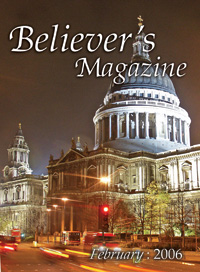Is there significance in the Holy Spirit being described as "descending from heaven like a dove" (Jn 1.32)? What does this mean and in what way does it differ from the Spirit coming upon the disciples as cloven tongues of fire in Acts 2?
We may note that it was John the Baptist who saw at the Lord’s baptism the Spirit descending like a dove and remaining on Him. This was an outward sign of assurance to John that the Lord was the true Messiah and the Son of God (see v.34). From the Lord’s baptism the Baptist saw things distinctly and was fully convinced as to the divine personage of the Lord. It was really, therefore, not for the Lord’s sake that the Spirit came in this way. We must not think this was the first time the Spirit came upon the Lord. The Lord was full of the Spirit from His incarnation. The dove by the world might be regarded as a symbol of peace, but in the dove sent forth from Noah’s ark it is a symbol of purity in contrast to the raven, the unclean bird. The coming in this way upon the Lord proved to John the sinlessness of the Lord. The dove found no rest for the sole of its foot, but here in the Lord the Spirit finds perfect rest.
As to the cloven tongues of fire sitting upon each of the disciples on the Day of Pentecost, this was the outward symbol of what for the first time was taking place – the indwelling of the Holy Spirit within the believer. I suggest that the mention of fire in contrast to the dove in John 1 speaks of judgment and indicates that there was that which needed to be burnt up, as it were, before the Spirit indwelt the disciples. There was no such prerequisite preparation or process needed in the Lord Jesus. This much at least should be seen as we contrast John’s description of the Spirit coming upon the Saviour. It shows the moral purity and excellence of the Lord Jesus, but in the case of a believer, sin has to be judged and dealt with and new birth has to be experienced before the blessing of the Spirit’s presence can be known. The indwelling of the Spirit in this age of grace is a stupendous truth and we ought to be deeply grateful for it and seek to know more of the reality of it.
John J Stubbs
The practice of having different speakers every second or third week at the weekly ministry meeting leads to teaching which is not systematic and leaves much of Scripture untaught. What is the answer to this in an assembly which has no teachers in fellowship?
The present writer finds it difficult to accept that in an assembly with, say, at least thirty in fellowship, no brother has the gift of a teacher. It may be that such gift is there but is not being exercised, through neglect on the part of the individual or through lack of opportunity for that gift to be developed.
Paul exhorted Timothy, "Neglect not the gift that is in thee" (1 Tim 4.14). Gift does not act by itself; it requires the co-operation of the possessor. As a limb that is not used will atrophy, so a gift not exercised will lose its usefulness. Gift can develop with the using; it requires time and experience. It has to be said that neglect of gift is sin. Later Paul wrote, "stir up (rekindle, keep in full blaze) the gift of God, which is in thee" (2 Tim 1.6). It should be pointed out that it was not in Timothy’s case that he had grown cold, but there was the possibility of decline in the exercise of it.
One of the weaknesses in assembly testimony today is the lack of systematic, consecutive Bible teaching. Whilst Bible readings do have their place, there is really no substitute for a gifted teacher standing before the people of God expounding and applying the Scriptures.
Paul in his charge to the elders from Ephesus says, "I have not shunned to declare unto you all the counsel of God" (Acts 20.27). He had hidden nothing from the believers and had shown his faithfulness to the truth that God had committed to him. Paul was "pure from the blood of all men" (Acts 20.26) in that no one could accuse him of keeping back vital truth from those able to bear it. At Corinth Paul "continued … a year and six months, teaching the word of God among them" (Acts 18.11).
Overseers in smaller assemblies need to ensure that suitable spiritual food is provided for the flock. It may be necessary to invite gifted teachers to take series of teaching meetings on a range of topics in order that the breadth of Scripture might be covered.
David E West









